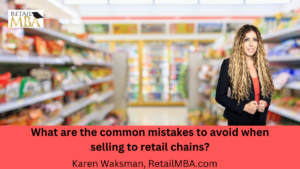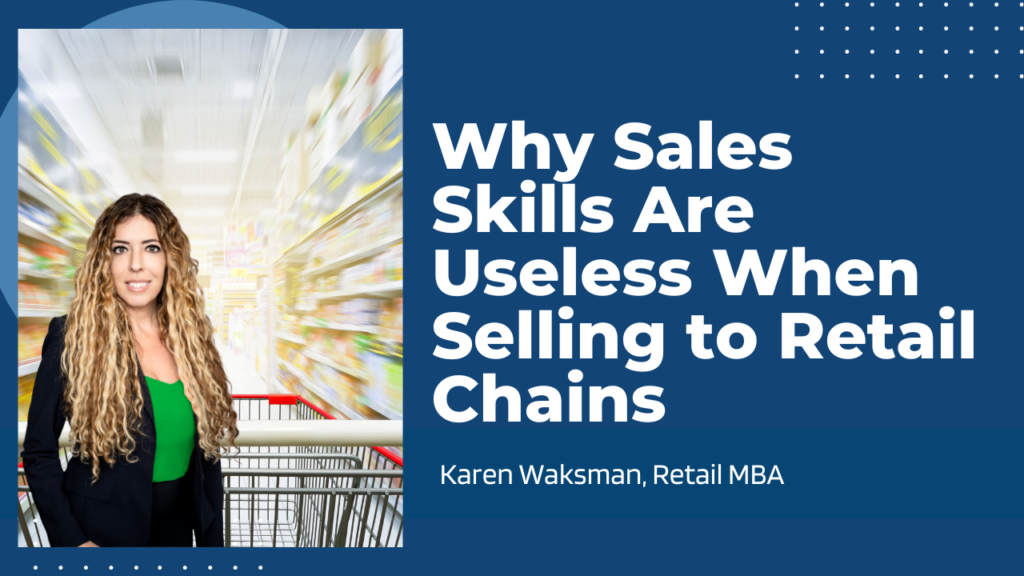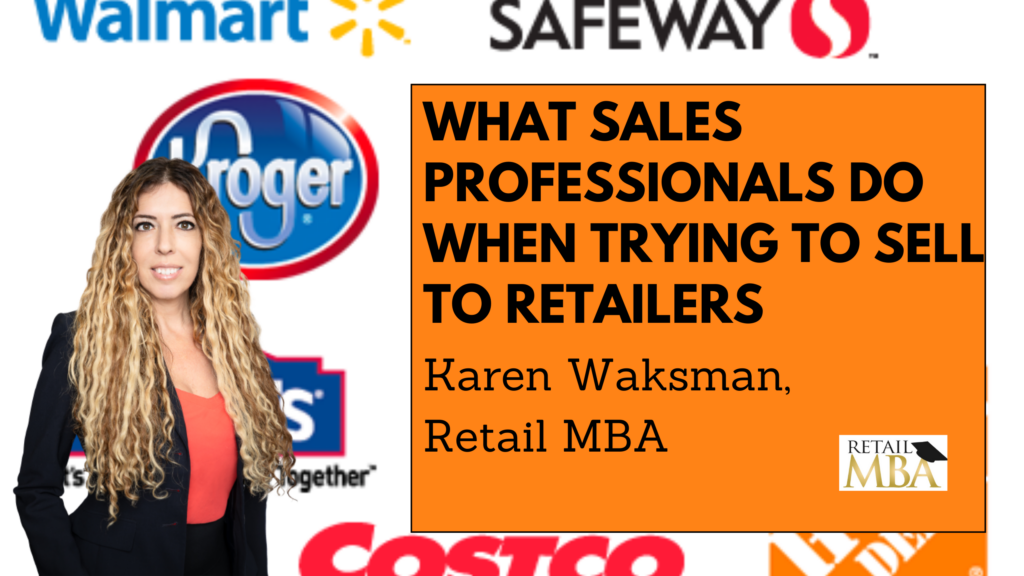Get Your Product in Stores – Your Sales Skills Are Useless
In this short video training, we will explain the reasons why traditional sales skills are ineffective when it comes to selling products to chain stores. As the founder of Retail MBA, I have experience in selling products to major retailers for close to 20 years. Through my interactions with buyers, I’ve come to realize that achieving sales success in this industry hinges more on thinking and understanding the buyers needs, than on any conventional sales techniques. In this short video, I’ll explain why strategy outweighs sales skills when it comes to getting your products onto chain store shelves!
The Significance of Strategy
When it comes to selling products to chain stores, strategy is paramount. Retail buyers are primarily focused on identifying products that seamlessly align with their store offerings, and can generate revenue for their retailer. They aren’t concerned with your personality or how you approach selling; their main priority is assessing the profitability of your product.
Remarkably I have received product sales without meeting buyers in person—solely through phone conversations. This demonstrates that personal selling skills don’t hold the influence in securing placements for your products within chain stores.
The Importance of Strategy in Selling to Chain Stores
When it comes to selling your products to chain stores strategic thinking is key.
Here are some crucial areas where strategy plays a role;
Product Packaging; Paying attention to how you package your product is essential for making it appealing to buyers. It’s important to consider how it will stand out on store shelves and attract customers. A designed eye catching package can make a difference in getting your product noticed.
Strategizing your pricing is crucial when it comes to convincing buyers to stock your product. Ensuring that your pricing is competitive and aligns with the market is vital. Buyers are looking for products that will sell well and generate profits for their stores so pricing plays a role in their decision making process.
Developing a marketing strategy that generates interest and drives customers to the stores is essential. Buyers want to see that you have a plan in place to promote your product and create demand. This could involve advertising, social media campaigns or collaborations with influencers.
Understanding Buyer Expectations
To succeed in selling to chain stores, it’s important to grasp what buyers expect from you. This includes understanding their target market and their stores brand image as their specific requirements, for product placement and promotion.
By focusing on these aspects, you increase your chances of selling your products in chain stores.
To increase your chances of capturing a buyers attention, it is important to align your product with their expectations. The power of creativity and thinking outside the box plays a role when selling to chain stores. Of being salespeople product creators have an advantage, in offering innovative products that attract customers and generate revenue. Understanding what buyers are seeking and customizing your product to meet their needs gives you an edge.
Strategic Thinking
In the realm of selling to chain stores strategic thinking outweighs sales skills. Retail buyers prioritize finding products that seamlessly fit into their stores and drive profitability. Your sales abilities and personality are not their concerns; they primarily care about the profitability your product can bring. Succeeding in this industry entails buyer expectations effectively packaging your product devising pricing strategies and crafting a compelling marketing plan.
As someone who has founded Retail MBA I have personally witnessed that strategy is crucial for placing products, on chain store shelves. Personal selling skills alone do not determine success when it comes to landing deals with buyers.
Instead your success lies in your ability to think strategically and align your product with the needs and expectations of buyers.
The packaging of your product plays a role, in capturing the interest of buyers. It’s essential to consider how it will stand out on store shelves and attract customers. A designed and visually appealing package can make a difference in getting your product noticed.
Pricing Strategy
Pricing is another factor when it comes to selling to chain stores. It’s important to strategize your pricing to ensure competitiveness and alignment with the market. Buyers are looking for products that will sell well and generate profits for their stores so pricing plays a role in their decision making process.
Developing a marketing strategy that generates interest and drives customers to the stores is essential. Buyers want assurance that you have a plan in place to promote your product and create demand. This may involve advertising, social media campaigns or collaborations with individuals.
Understanding buyer expectations is key to succeeding in selling products through chain stores. It’s crucial to be aware of their target market their stores brand image as their specific requirements, for product placement and promotion. By aligning your product with their expectations you enhance the likelihood of capturing a buyers attention.
Selling products to chain stores offers an advantage to product creators who can showcase their creativity and think outside the box. Of being salespeople they have the opportunity to present innovative products that will attract customers and boost revenue. As a product creator you possess the advantage of understanding what buyers are seeking and can tailor your offerings accordingly.
Get Your Product in Stores Now!
In summary when it comes to selling products, in chain stores traditional sales skills take a backseat to thinking. Retail buyers primarily seek products that seamlessly fit into their stores and generate profits. They are less concerned with your sales abilities or personality; their main focus is on the profitability of your product. To thrive in this industry it’s crucial to grasp buyer expectations effectively package your product devise a pricing strategy and craft a marketing plan.
As the founder of Retail MBA I’ve witnessed firsthand how strategy plays a role in getting products onto chain store shelves. Personal selling skills alone do not guarantee success when dealing with buyers. Instead it’s your ability to think strategically and align your product, with the buyers needs and expectations that truly make an impact.
To improve your chances of selling to chain stores it is important to pay attention to packaging, pricing, marketing and understanding what buyers expect.
If you found the information provided useful I would greatly appreciate your comments and feedback. Keep an eye out for content as I constantly update it with new information to assist you in successfully getting your products into stores. Thank you for taking the time to rea

Check Out our Additional Blog Posts!

Retail Terms
Retail Terms – What are the payment terms typically offered by retail chains? Click Here to Learn More!

Retail Vendor
Retail Vendor – What are the common mistakes to avoid when selling to retail chains? Click Here to Learn More!

How to Sell Your Holiday Products to Retail Chains
New Training on How to Sell Your Holiday Products to Retail Chains

Why Buyers Don’t Want Your Product at Retail
Why Buyers Don’t Want Your Product

Ulta Beauty Vendor
Ulta Beauty Vendor – How to Sell to Ulta Beauty Stores. Click Here to Learn More!

Retail Strategy
Retail Strategy – How do I handle negotiations with retail chains? Click Here to Learn More!
Transcript Outline on How to Get Your Product in Stores and Why Sales Skills Are Useless!
In the world of retail a successful pitch to chain stores requires a distinctive approach. While many believe that traditional sales skills are crucial. Strategy actually plays a much more significant role in securing deals with retail giants. In this article we will explore the insights shared by Karen Waksman, founder of Retail MBA, who emphasizes the importance of strategy when selling to chain stores.
With her extensive experience in selling millions of units to the worlds largest retailers. Karen sheds light on how strategy is pivotal in convincing retail buyers and provides valuable guidance on pitching your products effectively. The Dominance of Strategy over Sales Skills.
Karen Waksman, an expert in the retail industry argues that ordinary sales skills have limited effectiveness when it comes to selling to chain stores.
Product Assortment
Drawing from her wealth of experience she emphasizes that retail buyers are primarily concerned with how well a product fits within their store and its potential revenue generation for their company. Personalities and sales techniques take a backseat to strategic considerations. Understanding the Buyers’ Perspective
As Karen points out. Sellers often approach retail buyers whom they have never met face to face.
Communication typically occurs over the phone or through other means. Depending on the retailer. What matters most to buyers is how effectively a product aligns with their stores’ offerings and its ability to drive revenue. Buyers prioritize the bottom line and require compelling packaging, pricing, and marketing strategies that will capture customers’ interest and lead to sales.
The Creative Advantage
Entrepreneurs and product creators are often fueled by creativity and possess a unique advantage when selling to chain stores. Instead of relying on traditional sales skills. They can leverage their creative thinking and strategizing abilities. Buyers seek innovative products that stand out from competitors and can generate profits.
Entrepreneurs who exhibit a deep understanding of buyer expectations and customize their pitches accordingly are more likely to succeed in the retail space.
The Significance of Strategy
Effective strategy plays a crucial role in achieving successful product placement within chain stores. It encompasses several critical aspects, including product packaging, pricing, and marketing. Entrepreneurs must strategize meticulously how to make their products irresistible enough to entice customers into making purchases while ensuring profitability for themselves and retailers through suitable pricing strategies.
Additionally well executed marketing campaigns can generate customer interest leading to increased foot traffic within stores. Empowering entrepreneurs and small business owners. Karen Waksmans’ influential Retail MBA program provides comprehensive insights into essential strategies needed for pitching and selling products effectively to retailers. With emphasis placed on understanding the expectations and needs of retail buyers rather than solely relying on sales skills this course equips individuals with invaluable knowledge enabling them to navigate confidently within the intricate realm of retail while successfully securing deals with prominent chain stores. In conclusion
Selling products within chain stores necessitates a change in mindset evolving from traditional sales skills to adopting a strategic approach.
Retail buyers prioritize offerings that align with their stores’ products and have the potential to generate revenue. Entrepreneurs and product creators possess an artistic advantage and can effectively harness their innovative thinking to fulfill buyer expectations through strategic planning. By recognizing the significance of strategy and tailoring their pitches accordingly entrepreneurs significantly elevate their chances of success within this fiercely competitive retail industry. Fortunately. Aspiring entrepreneurs seeking guidance can rely on invaluable resources like Retail MBA to acquire the theoretical knowledge and practical guidance indispensable for flourishing within the retail world while securing partnerships with esteemed chain stores.



